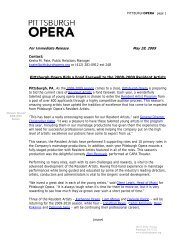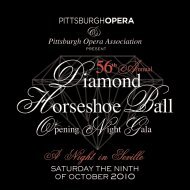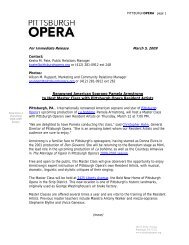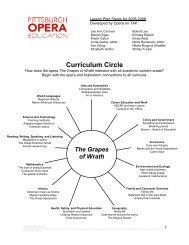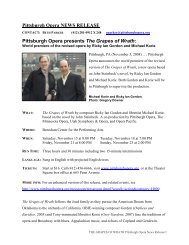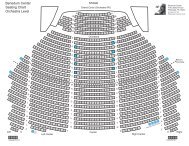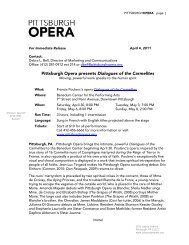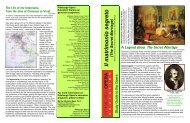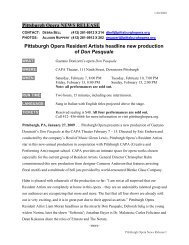View the STUDY GUIDE for Don Giovanni - Pittsburgh Opera
View the STUDY GUIDE for Don Giovanni - Pittsburgh Opera
View the STUDY GUIDE for Don Giovanni - Pittsburgh Opera
You also want an ePaper? Increase the reach of your titles
YUMPU automatically turns print PDFs into web optimized ePapers that Google loves.
<strong>Don</strong> Juan in Modern Times<br />
Did you know that . . .<br />
by Jill Leahy<br />
<strong>Don</strong> Juan (1926) is a Warner<br />
Bro<strong>the</strong>rs film. It was <strong>the</strong> first featurelength<br />
film with synchronized sound<br />
effects and musical soundtrack, with<br />
no spoken dialogue. Premiered in New<br />
York City on August 6, 1926, starring<br />
John Barrymore as <strong>the</strong> hand-kissing<br />
womanizer. It has <strong>the</strong> most kisses in<br />
film history, with Barrymore kissing<br />
191 different women in <strong>the</strong> film.<br />
<strong>Don</strong> Juan DeMarco is a 1995<br />
American romantic comedy-drama<br />
film starring Johnny Depp as John<br />
Arnold DeMarco, a man who believes<br />
he’s <strong>Don</strong> Juan, <strong>the</strong> greatest lover in<br />
<strong>the</strong> world. Wearing a cape and mask,<br />
he approaches and romances women<br />
until he gets into trouble with <strong>the</strong><br />
police, who send him <strong>for</strong> psychiatric<br />
treatment with Marlon Brando's<br />
character, Dr. Jack Mickler, to cure<br />
him of his apparent delusion. During<br />
<strong>the</strong> psychiatric sessions, <strong>Don</strong> Juan<br />
DeMarco has an unexpectedly<br />
inspirational effect on <strong>the</strong> psychiatric<br />
staff. Even Dr. Mickler himself seems<br />
to fall under <strong>the</strong> spell of <strong>the</strong> legend<br />
and <strong>the</strong> doctor works to rekindle <strong>the</strong><br />
romance in his stale marriage with<br />
Faye Dunaway.<br />
Io, <strong>Don</strong> <strong>Giovanni</strong> is a 2009 movie<br />
based on <strong>the</strong> life of Italian librettist<br />
Lorenzo da Ponte, who collaborated<br />
with Mozart on <strong>Don</strong> <strong>Giovanni</strong>.<br />
<strong>Don</strong> <strong>Giovanni</strong> was widely sung in Germany as a Singspiel<br />
during Mozart’s lifetime, becoming, after Die Entführung aus<br />
dem Serail, <strong>the</strong> Mozart opera most per<strong>for</strong>med at that time.<br />
Mozart was dissatisfied with <strong>the</strong> scream given by Zerlina<br />
when <strong>Don</strong> <strong>Giovanni</strong> was making improper advances to her<br />
in Act 1, Scene 6. So, during <strong>the</strong> rehearsal <strong>for</strong> <strong>the</strong> scene,<br />
Mozart sneaked up behind her and, at <strong>the</strong> right moment,<br />
gave her a hard pinch! Zerlina gave a more realistic scream<br />
and Mozart said he was finally satisfied.<br />
<strong>Pittsburgh</strong> <strong>Opera</strong><br />
Education thanks our<br />
generous supporters:<br />
Allegheny Regional Asset District<br />
American Eagle Outfitters, Inc.<br />
Bayer USA Foundation<br />
The Berkman Charitable Trust<br />
Benedum Foundation<br />
BRIDGES & Company, Inc.<br />
Buncher Family Foundation<br />
Anne L. & George H. Clapp Charitable Trust<br />
Chautauqua <strong>Opera</strong> Guild<br />
Clearview Federal Credit Union<br />
Dominion Foundation<br />
Eaton Corporation<br />
Eden Hall Foundation<br />
EQT Foundation<br />
First Commonwealth Financial<br />
FISA Foundation<br />
Fort Pitt Capital Group, Inc.<br />
Frick Fund of The Buhl Foundation<br />
Giant Eagle Foundation<br />
The Grable Foundation<br />
The Guilds of <strong>Pittsburgh</strong> <strong>Opera</strong><br />
The Hearst Foundation<br />
Hefren-Tillotson, Inc.<br />
The Heinz Endowments<br />
Highmark Blue Cross Blue Shield<br />
Levin Furniture<br />
The Massaro Corporation<br />
William V. & Ca<strong>the</strong>rine A. McKinney<br />
Charitable Foundation<br />
McCreery Fund of The Buhl Foundation<br />
R. K. Mellon Foundation<br />
National Endowment <strong>for</strong> <strong>the</strong> Arts<br />
Pennsylvania Council on <strong>the</strong> Arts<br />
Pennsylvania Department of Community &<br />
Economic Development<br />
Pennsylvania Department of Education<br />
The PNC Financial Services Group, Inc.<br />
PPG Industries, Inc.<br />
Bobby Rahal Motorcar Company<br />
Reed Smith LLP<br />
The Techs<br />
Triangle Tech Group<br />
United States Steel Corporation<br />
UPMC Health System<br />
For more in<strong>for</strong>mation on<br />
<strong>Pittsburgh</strong> <strong>Opera</strong>'s education<br />
programs, please contact:<br />
Marilyn Michalka Egan, Ph.D.<br />
Director of Education<br />
megan@pittsburghopera.org<br />
412-281-0912 ext 242<br />
<strong>Pittsburgh</strong> <strong>Opera</strong><br />
2425 Liberty Avenue<br />
<strong>Pittsburgh</strong>, PA 15222<br />
www.pittsburghopera.org<br />
<strong>Don</strong> <strong>Giovanni</strong><br />
Music by Wolfgang Amadeus Mozart ● Libretto by Lorenzo da Ponte<br />
Study Guide to <strong>the</strong> <strong>Opera</strong><br />
Production Photo by Tim Ma<strong>the</strong>son at Vancouver <strong>Opera</strong><br />
Wolfgang Amadeus Mozart<br />
(1756—1791)<br />
Set design <strong>for</strong> <strong>Don</strong>na Anna’s<br />
chamber by Philippe<br />
Chaperon (1823—1906),<br />
Théâtre Lyrique on 8 May 1866.<br />
Source: Bibliothèque<br />
nationale de France<br />
Mozart Re-imagines <strong>the</strong><br />
<strong>Don</strong> Juan Legend<br />
Following <strong>the</strong> wildly successful production of Le nozze di Figaro in<br />
1786 in Vienna, Mozart was asked to compose an opera <strong>for</strong> Prague.<br />
Some scholars think he was asked to expand on <strong>the</strong> one-act opera,<br />
<strong>Don</strong> <strong>Giovanni</strong> Tenorio, or The Stone Guest, originally composed by<br />
Giuseppe Gazzaniga with a libretto by <strong>Giovanni</strong> Bertati. Mozart turned<br />
once again to Lorenzo da Ponte to collaborate on this commission, and<br />
toge<strong>the</strong>r <strong>the</strong>y agreed on creating a production that incorporated both<br />
humor and drama in <strong>the</strong> story. Most accounts concur that da Ponte<br />
improved Bertati’s libretto and drew on o<strong>the</strong>r plays, most probably<br />
Molière’s Dom Juan. About half <strong>the</strong> libretto, between <strong>the</strong> Act 1 quartet<br />
and <strong>the</strong> graveyard scene, is from <strong>the</strong> original work by <strong>Giovanni</strong> Bertati.<br />
by Jill Leahy<br />
There are many stories describing what was happening in Mozart’s life at<br />
<strong>the</strong> time he was composing this opera, but most assert that he worked on<br />
<strong>the</strong> Overture right up to <strong>the</strong> night be<strong>for</strong>e its first per<strong>for</strong>mance. Written as a<br />
dramma giocoso in two acts, <strong>Don</strong> <strong>Giovanni</strong> premiered at <strong>the</strong> Prague Italian<br />
opera at <strong>the</strong> Teatro di Praga on October 29, 1787 and was conducted by<br />
Mozart himself. First per<strong>for</strong>med under its full title, Il Dissoluto Punito ossia il<br />
<strong>Don</strong> <strong>Giovanni</strong> Dramma giocoso (Translation: The Rake Punished, or <strong>Don</strong><br />
Juan), it is now generally known as <strong>Don</strong> <strong>Giovanni</strong>. And, according to one<br />
author (Henry Simon), Gioacchino Rossini, Charles Gounod, and Richard<br />
Wagner all considered <strong>Don</strong> <strong>Giovanni</strong> to be <strong>the</strong> greatest opera ever written.<br />
The legend of <strong>Don</strong> Juan has been told in plays, ballets, operas, literature<br />
(with a famous poem by Lord Byron), and even a musical tone poem by <strong>the</strong><br />
German composer Richard Strauss. But today, <strong>Opera</strong>base lists Mozart’s<br />
<strong>Don</strong> <strong>Giovanni</strong> as <strong>the</strong> 10 th most popular opera in <strong>the</strong> world based on<br />
frequency of per<strong>for</strong>mances worldwide.<br />
http://operabase.com/top.cgi?lang=en&
<strong>Don</strong> <strong>Giovanni</strong> Synopsis<br />
Time—<strong>the</strong> mid-seventeenth century<br />
Place—Seville, Spain<br />
ACT I. Spain, 1600s. At night, outside <strong>the</strong> Commendatore's palace,<br />
Leporello grumbles about his duties ("Notte e giorno faticar") as servant to<br />
<strong>Don</strong> <strong>Giovanni</strong>, a dissolute nobleman. Soon <strong>the</strong> masked <strong>Don</strong> appears, pursued<br />
by <strong>Don</strong>na Anna, <strong>the</strong> Commendatore's daughter, whom he has tried to seduce.<br />
When <strong>the</strong> Commendatore himself answers Anna's cries, he is killed in a duel<br />
by <strong>Giovanni</strong>, who escapes. Anna now returns with her fiancé, <strong>Don</strong> Ottavio.<br />
Finding her fa<strong>the</strong>r dead, she makes Ottavio swear vengeance on <strong>the</strong> assassin<br />
("Ma qual mai s'offre, o dei").<br />
At dawn, <strong>Giovanni</strong> flirts with a high-strung traveler outside a tavern. She turns<br />
out to be <strong>Don</strong>na Elvira, a woman he once seduced in Burgos, who is on his<br />
trail. <strong>Giovanni</strong> escapes while Leporello distracts Elvira by reciting his master's<br />
<strong>Don</strong> Juan and <strong>the</strong> statue of <strong>the</strong> Commander,<br />
Alexandre-Évariste Fragonard, circa 1830-1835.<br />
long catalog of conquests ("Madamina, il catalogo è questo"). Peasants arrive, celebrating <strong>the</strong> nuptials of<br />
<strong>the</strong>ir friends Zerlina and Masetto. When <strong>Giovanni</strong> joins in, he pursues <strong>the</strong> bride, angering <strong>the</strong> groom, who is<br />
removed by Leporello. Alone with Zerlina, <strong>the</strong> <strong>Don</strong> applies his charm ("Là ci darem la mano"), but Elvira<br />
interrupts and protectively whisks <strong>the</strong> girl away. When Elvira returns to denounce him as a seducer ("Non ti<br />
fidar, o misera"), <strong>Giovanni</strong> is stymied fur<strong>the</strong>r while greeting Anna, now in mourning, and Ottavio. Declaring<br />
Elvira mad, he leads her off. Anna, having recognized his voice, realizes <strong>Giovanni</strong> was her attacker.<br />
Dressing <strong>for</strong> <strong>the</strong> wedding feast he has planned <strong>for</strong> <strong>the</strong> peasants, <strong>Giovanni</strong> exuberantly downs champagne<br />
("Finch'han dal vino"). Outside <strong>the</strong> palace, Zerlina begs Masetto to <strong>for</strong>give her apparent infidelity ("Presto,<br />
presto, pria ch'ei venga"). Masetto hides when <strong>the</strong> <strong>Don</strong> appears, emerging from <strong>the</strong> shadows as <strong>Giovanni</strong><br />
corners Zerlina ("Riposate, vezzose ragazze!"). The three enter <strong>the</strong> palace toge<strong>the</strong>r ("Venite pur avanti").<br />
Elvira, Anna, and Ottavio are invited to <strong>the</strong> feast by Leporello.<br />
During <strong>the</strong> festivities, Leporello entices Masetto into <strong>the</strong> dance as <strong>Giovanni</strong> draws Zerlina out of <strong>the</strong> room.<br />
When <strong>the</strong> girl's cries <strong>for</strong> help put him on <strong>the</strong> spot, <strong>Giovanni</strong> tries to blame Leporello, but no one is convinced.<br />
Elvira ("Ecco il birbo che t'ha offesa"), Anna, and Ottavio unmask and confront <strong>Giovanni</strong>, who barely<br />
escapes Ottavio's drawn sword.<br />
Intermission<br />
ACT II. ("Sola, sola, in buio loco") Under Elvira's balcony, Leporello exchanges cloaks with <strong>Giovanni</strong> to<br />
woo <strong>the</strong> lady in his master's stead. Leporello leads Elvira off, leaving <strong>the</strong> <strong>Don</strong> free to serenade Elvira's maid.<br />
When Masetto passes with a band of armed peasants bent on punishing <strong>Giovanni</strong>, <strong>the</strong> disguised rake gives<br />
<strong>the</strong>m false directions, <strong>the</strong>n beats up Masetto. Zerlina arrives and tenderly consoles her betro<strong>the</strong>d.<br />
In a passageway, Elvira and Leporello are surprised by Anna, Ottavio, Zerlina ("Mille torbidi pensieri"),<br />
and Masetto, who, mistaking servant <strong>for</strong> master, threaten Leporello. Frightened, he unmasks and escapes.<br />
When Anna departs, Ottavio affirms his confidence in <strong>the</strong>ir love. Elvira, frustrated at her second betrayal by<br />
<strong>the</strong> <strong>Don</strong>, voices her rage. Leporello catches up with his master in a cemetery, where a voice warns <strong>Giovanni</strong><br />
of his doom. This is <strong>the</strong> statue of <strong>the</strong> Commendatore, which <strong>the</strong> <strong>Don</strong> proposes Leporello invite to dinner<br />
("O statua gentilissima"). When <strong>the</strong> servant reluctantly stammers an invitation, <strong>the</strong> statue accepts.<br />
In her home, Anna, still in mourning, puts off Ottavio's offer of marriage until her fa<strong>the</strong>r is avenged.<br />
Leporello is serving <strong>Giovanni</strong>'s dinner ("Già la mensa è preparata") when Elvira rushes in, begging <strong>the</strong><br />
<strong>Don</strong>, whom she still loves, to re<strong>for</strong>m ("L'ultima prova dell'amor mio"). But, he waves her out<br />
contemptuously. At <strong>the</strong> door, her screams announce <strong>the</strong> Commendatore's statue. <strong>Giovanni</strong> boldly refuses<br />
warnings to repent, even in <strong>the</strong> face of death ("<strong>Don</strong> <strong>Giovanni</strong>, a cenar teco"). Flames engulf his house,<br />
and <strong>the</strong> sinner is dragged to hell.<br />
Among <strong>the</strong> castle ruins, <strong>the</strong> o<strong>the</strong>rs plan <strong>the</strong>ir future and recite <strong>the</strong> moral: such is <strong>the</strong> fate of a wrongdoer.<br />
by John W. Freeman, courtesy of <strong>Opera</strong> News<br />
Characters Characters of of <strong>the</strong> <strong>the</strong> <strong>Opera</strong> <strong>Opera</strong><br />
<strong>Opera</strong><br />
<strong>Don</strong> <strong>Giovanni</strong><br />
[dohn joh-VAH-nee] bass-baritone<br />
A young nobleman and great seducer<br />
of women, he kills <strong>the</strong> angry<br />
Commendatore after seducing his<br />
daughter, <strong>Don</strong>na Anna.<br />
Leporello<br />
[leh-poh-REHL-loh] bass<br />
<strong>Don</strong> <strong>Giovanni</strong>’s uphappy servant, who<br />
must keep watch during <strong>the</strong> <strong>Don</strong>’s<br />
conquests. Leporello warns <strong>Don</strong>na<br />
Elvira of <strong>Giovanni</strong>’s sketchy ways.<br />
<strong>Don</strong>na Anna<br />
[DOH-nah AH-nah] soprano<br />
The Commendatore’s daughter, who<br />
seeks revenge <strong>for</strong> her fa<strong>the</strong>r’s murder.<br />
<strong>Don</strong>na Elvira<br />
[DOH-nah ell-VEE-rah] soprano<br />
A noblewoman from Burgos, previously<br />
seduced by <strong>Don</strong> <strong>Giovanni</strong>, only to be<br />
abandoned by him three days later.<br />
<strong>Don</strong> Ottavio<br />
[dohn oh-TAH-vee-oh] tenor<br />
Adoring fiancé of <strong>Don</strong>na Anna, he<br />
seeks to avenge <strong>the</strong> Commendatore’s<br />
murder.<br />
Zerlina<br />
[tser-LEE-nah] soprano<br />
A peasant betro<strong>the</strong>d to Masetto. <strong>Don</strong><br />
<strong>Giovanni</strong> tries to seduce her be<strong>for</strong>e her<br />
wedding.<br />
Commendatore<br />
[koh-mehn-dah-TOR-eh] bass<br />
Fa<strong>the</strong>r of <strong>Don</strong>na Anna who fights <strong>Don</strong><br />
<strong>Giovanni</strong> out of anger <strong>for</strong> seducing his<br />
daughter. <strong>Don</strong> <strong>Giovanni</strong> kills him.<br />
Masetto<br />
[mah-ZEH-toh] bass<br />
A peasant betro<strong>the</strong>d to Zerlina.<br />
Musicians<br />
Peasants<br />
Attendants<br />
Maskers<br />
Villagers<br />
Ladies<br />
Servants<br />
Officers of Justice<br />
Chorus of Demons<br />
A Prolific Composer<br />
by Jill Leahy<br />
Born on January 27, 1756<br />
in Salzburg, Austria, his full given<br />
names were Johannes Chrysostomos<br />
Wolfgang Theophilus. Today, most<br />
call him Wolfgang Amadeus Mozart,<br />
with Amadeus being <strong>the</strong> Latin version<br />
of <strong>the</strong> Greek Theophilus.<br />
His life story is told often, and with each telling facts and fiction are<br />
intertwined. [See Amadeus, a 1984 period drama film directed by Miloš<br />
Forman and written by Peter Shaffer.] Never<strong>the</strong>less, he remains one of <strong>the</strong><br />
most well-known and beloved composers of classical music. There’s no<br />
question he was a child prodigy with exceptional musical ability. His fa<strong>the</strong>r,<br />
Leopold, ensured that he traveled to <strong>the</strong> major musical cities and venues<br />
where he could be introduced to many important people of his day, with <strong>the</strong><br />
intention that Mozart would acquire wealthy patrons who would generously<br />
reward his talents.<br />
Most Mozart biographers agree that he excelled in virtually every genre and<br />
type of musical composition. He composed over 600 works and, during his<br />
final years in Vienna, he created many of his best-known symphonies,<br />
concertos, and operas. He would probably be considered a multi-tasker in<br />
today’s jargon, because he often had several projects going at <strong>the</strong> same<br />
time. While he had success during his life, political circumstances (<strong>the</strong><br />
Austro-Turkish war) affected <strong>the</strong> aristocracy’s ability to pay musicians,<br />
<strong>for</strong>cing Mozart to travel outside Vienna <strong>for</strong> work. And even though his<br />
<strong>for</strong>tunes improved in 1791, his health un<strong>for</strong>tunately took a bad turn while he<br />
was anxiously trying to finish a commissioned work, <strong>the</strong> Requiem Mass in<br />
D minor. Mozart died at <strong>the</strong> age of 35 on December 5, 1791. The Requiem<br />
was later finished by his student Franz Xaver Süssmayr.<br />
The Librettist of Venice<br />
What a storied life Lorenzo da Ponte led! Friends with<br />
Casanova, Salieri, Mozart. A priest, a poet, a<br />
philanderer, and <strong>the</strong> first professor of Italian Literature<br />
at Columbia College (now Columbia University).<br />
Mozart playing <strong>Don</strong> Juan <strong>for</strong> <strong>the</strong> first time in Vienna<br />
by Jill Leahy<br />
In 1749, Emmanuele Conegliano was born in a<br />
Jewish ghetto near Venice. When he was 14, his<br />
widowed fa<strong>the</strong>r remarried a Catholic, which required<br />
<strong>the</strong> family to convert. As was <strong>the</strong> custom, Emmanuele<br />
adopted <strong>the</strong> name of <strong>the</strong> Bishop who baptized him—<br />
Lorenzo da Ponte (1749—1838)<br />
Lorenzo da Ponte. As a young man, he discovered<br />
<strong>the</strong> beauty of poetry and books; he trained <strong>for</strong> <strong>the</strong> priesthood and <strong>for</strong><br />
teaching. He was ordained, but soon found himself in trouble because<br />
of his liberal political views and his affairs with married women. For 15<br />
years, he lived in exile in Venice. Eventually, he made his way to<br />
Vienna and met composers Antonio Salieri and Mozart, with whom he<br />
collaborated on Le nozze di Figaro (1786), <strong>Don</strong> <strong>Giovanni</strong> (1787), and<br />
Così fan tutte (1790).<br />
After Mozart’s death, Lorenzo da Ponte moved to Paris and <strong>the</strong>n to<br />
London. There, he worked on operas with o<strong>the</strong>r composers, including<br />
Cimarosa. After declaring bankruptcy, da Ponte left London <strong>for</strong> America<br />
to elude creditors. In New York he opened a bookstore and gave Italian<br />
language and literature lessons to private students. In addition to his<br />
o<strong>the</strong>r writing, he left a legacy of 28 librettos written <strong>for</strong> 11 composers.



